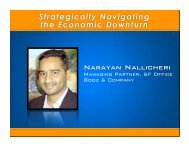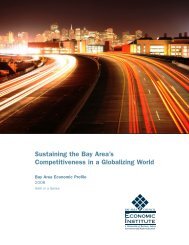Ties That Bind - Bay Area Council Economic Institute
Ties That Bind - Bay Area Council Economic Institute
Ties That Bind - Bay Area Council Economic Institute
You also want an ePaper? Increase the reach of your titles
YUMPU automatically turns print PDFs into web optimized ePapers that Google loves.
<strong>Bay</strong> <strong>Area</strong>-China Trade: Behind the Numbers<br />
the lead investors in Focus Media’s $172 million IPO, represented Chinese medical device manufacturer<br />
Mindray Medical International in its $270 million NYSE IPO, represented a Japanese<br />
photovoltaic cell maker being acquired by Chinese photovoltaic cell producer Suntech Power,<br />
and represented a Morgan Stanley-led consortium purchasing $1.3 billion in non-performing<br />
loans. Foreign law firms are following their investor clients beyond Beijing, Shanghai and<br />
Guangzhou into northern China and the interior.<br />
Competition Intensifies<br />
At first glance, there would seem to be a glut of foreign lawyers flocking to China, but in terms<br />
of specific commercial expertise and relationships there may actually be a shortage. The August<br />
2005 breakup of Coudert Bros. prompted a rush among firms to lock up the approximately 50<br />
Hong Kong, Beijing and Shanghai lawyers comprising Coudert’s China practice. Orrick, Herrington<br />
& Sutcliffe eventually prevailed over rival bidder Baker & McKenzie in acquiring the<br />
three offices, with other firms pursuing specific Coudert lawyers. Wilson Sonsini Goodrich &<br />
Rosati, meanwhile, responded to pressure from major Chinese clients and lured back its lead<br />
China attorney, who had moved to a Wall Street firm in 2005, to head a new Shanghai office.<br />
Foreign and Chinese lawyers currently have a complex relationship of cooperation and competition.<br />
They frequently work together in situations where the foreign firm’s client is involved in a<br />
court proceeding or requires an opinion letter based on Chinese law. And, as the experience and<br />
skills gaps between foreign and Chinese attorneys have narrowed, they more often pursue some<br />
of the same China business.<br />
Cost pressures add to the tension. Chinese clients commonly demand fixed fees and discounts,<br />
and select law firms primarily on price. Experienced lawyers are in short supply and charge a<br />
premium. Office rental and staffing costs, particularly in Beijing and Shanghai, are high by global<br />
standards. These and other factors have prompted foreign firms to seek out higher-end client<br />
work in areas such as IPOs or intellectual property protection and licensing. To manage workload<br />
and control costs, many have recruited Chinese law school graduates and lawyers willing to<br />
surrender their Chinese law licenses in order to obtain global practice experience and enhance<br />
their resumes. Foreign firms may pay Chinese staffers one-third the salary of a home country<br />
counterpart, but that still amounts to three times the salary at a Chinese firm.<br />
A trade group of Chinese lawyers in Shanghai has publicly complained that these non-licensed<br />
Chinese lawyers are unofficially drafting contracts, rendering opinion letters, preparing applications<br />
and registrations with government agencies, and directing litigations and arbitrations—<br />
work reserved under current rules for Chinese lawyers. The government issued a warning to<br />
foreign firms but otherwise has yet to act on the complaint.<br />
Song Zhu, a Chinese-born, U.S.-educated attorney with Squire Sanders in San Francisco who<br />
also has an engineering background and specializes in patent law, sees continued opportunities to<br />
assist U.S. firms entering the China market with IP protection and licensing, regulatory compliance<br />
and meeting technical standards. Down the road he sees Chinese companies branching out<br />
71








